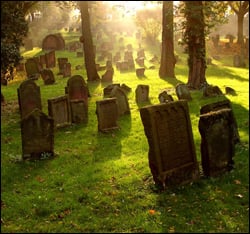Dear Rabbi,
I have attended my first Jewish funeral, and it was indeed a very profound and meaningful service.
While there are many things about the service I could inquire about, I am curious about one thing in particular. Everyone was saying to each other, “Baruch dayan ha'emet,” “Blessed is the true judge.” I found that it was almost like a greeting of some sort.
Can you explain this blessing?
Answer:
For thousands of years, Jews have been evoking the blessing of “Blessed is the true judge” in response to death and tragedy. The entire blessing, with G‑d’s name, is as follows: Blessed are You, L‑rd our G‑d, King of the universe, the True Judge.
In Hebrew it is pronounced: bah-rooch a-tah a-do-noi e-lo-hei-noo me-lech ha-o-lahm da-yan1 ha-e-met.
While only one who personally underwent a tragedy makes the full blessing with G‑d’s name, on hearing of the death of another, many respond by saying, “Baruch dayan ha'emet.”2 You may have also heard people responding to generally unpleasant news with the phrase, “This is also for the good.”
Blessings and the Opposite
What is the source for saying these statements? Let’s first start with a story that is related in the Talmud:
The great Sage Rabbi Akiva once arrived at a city. Upon arrival, he sought a place to lodge; however, no one provided him with one. He said, “All that G‑d does, He does for the good!” and he went to sleep in a field.
In the field he had with him a rooster, a donkey and a lamp.
A wind came and blew out the candle. A cat came and ate the rooster. A lion came and ate the donkey.
Rabbi Akiva said, “All that G‑d does, He does for the good!”
It turned out that marauders came and captured the residents of the city. Rabbi Akiva was saved because he was camped outside the city and had neither candle nor rooster that would have attracted attention to him.3
This story illustrates how even seemingly negative occurrences happen for a reason, even if that reason is not apparent, as it was in the end for Rabbi Akiva. Because of this truth, alluded to in this story, our sages said that we should always thank G‑d for the not-so-good happenings in our life, just as we thank G‑d for the good in our life.
In the words of the Mishnaic sages:
One should thank G‑d for the bad, just as he blesses G‑d for the good, as the verse says, “You shall love the L‑rd, your G‑d, with all your heart, with all your soul and with all of your means.”4 [The Hebrew word for “means” (me’odecha) also translates as “measure.”]
[Why does the verse say, “with all of your means”?] Whatever measure G‑d calculates for you, if it is good or bad, you should thank Him. 5
The Talmud explains this passage as saying that the same way one blesses G‑d for the good with joy, so too one should, with a complete heart,6 a complete mind and willingly, bless G‑d for the not-good that befalls one.7
When Death Occurs
Death is the most unexplainable concept that we face. Why did someone die when they did? Why did G‑d choose one person to live longer than the other? Why did the person have to suffer before his or her death?
However, even when it comes to death we are taught to bless G‑d; we say, “Blessed is the True Judge,” acknowledging that this is beyond our understanding.
There is an infinite difference between us and G‑d, and there is no way for us to understand His mysterious ways. We cannot comprehend; however, in spite of the pain of bereavement, we acknowledge that, ultimately, the “True Judge” knows what He is doing.8
Immediate family members9 of those who passed on from this world would make the blessing of “Baruch dayan ha'emet” as they rip their clothing during the funeral.10
Please see The Judaism Website’s mini-site on the Jewish Way in Death and Mourning.











Join the Discussion